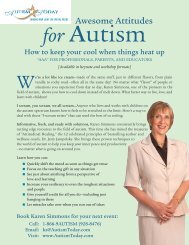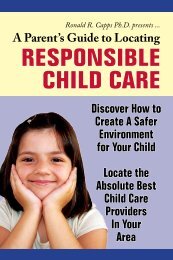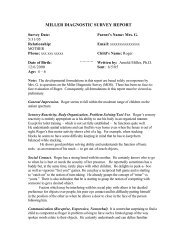Advice For Parents Of Young Autistic Children - Autism Today
Advice For Parents Of Young Autistic Children - Autism Today
Advice For Parents Of Young Autistic Children - Autism Today
Create successful ePaper yourself
Turn your PDF publications into a flip-book with our unique Google optimized e-Paper software.
Left untreated, many autistic children will not develop effective social skills and may not learn to talk or behave<br />
appropriately. Very few individuals recover completely from autism without any intervention. The good news is<br />
that there are a wide variety of treatment options which can be very helpful. Some treatments may lead to great<br />
improvement, whereas other treatments may have little or no effect. No treatment helps everyone. A variety of<br />
effective treatment options will be discussed below.<br />
ONSET OF AUTISM: Early Onset vs. Regression<br />
<strong>Autism</strong> develops sometime during pregnancy and the first three years of life. Some parents report that their child<br />
seemed different at birth. These children are referred to as early-onset autism. Other parents report that their child<br />
seemed to develop normally and then had a major regression resulting in autism, usually around 12-24 months.<br />
These children are referred as late-onset or regressive autism. Some researchers argue that the regression is not real<br />
or the autism was simply unnoticed by the child’s parents. However, many parents report that their children were<br />
completely normal (e.g., speech, behavior, social) until sometime between 1 and 2 years of age. The possible<br />
causative role of vaccinations, many of which were added to the vaccination schedule in the 1980’s, is a matter of<br />
considerable controversy at present.<br />
One recent study, conducted by the first author, compared 53 autistic children with 48 typical peers. The<br />
parents of the early-onset autism group reported a significant delay in reaching developmental milestones, including<br />
age of crawling (2 month delay), sitting up (2 month delay), walking (4-5 month delay), and talking (11 month delay<br />
or more). Thus, there appeared to be a delay in gross motor skills as well as of talking, so many children with<br />
autism also need physical therapy. In contrast, the late-onset autism group reached developmental milestones at the<br />
same time as typical children.<br />
Prior to 1990, approximately two-thirds of autistic children were autistic from birth and one-third regressed<br />
sometime after age one year. Starting in the 1990’s, the trend has reversed — fewer than one-third are now autistic<br />
from birth and two-thirds become autistic in their second year (see figure below). The following results are based<br />
on the responses to ARI’s E-2 checklist, which has been completed by thousands of autism families. These results<br />
suggest that something happened, such as increased exposure to an environmental insult, possibly vaccine damage,<br />
between ages 1 and 2 years.<br />
Several brain autopsy studies have indicated that brain damage occurred sometime during the first trimester<br />
of pregnancy, but many of these studies involved individuals who were born prior to 1990. Thus, these findings<br />
may not apply to what appears to be the new population of regressive autism.<br />
2





